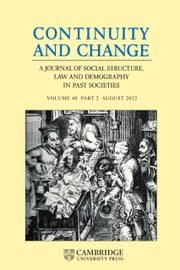No CrossRef data available.
Article contents
Afterword: hidden beauty
Published online by Cambridge University Press: 28 April 2023
Extract
People love a secret, as long as they are in on it. One might even argue that historians are more attracted to secrecy than the average scholar, or average individual, in that the tools we have for unearthing documentation from the past regularly trawl up long-dormant secrets. At one time, someone may have died to preserve this secret; for me, it is lying accessible in an archive. The challenge is not reading the secret – it is crafting an argument and a narrative that would make others care for this once tightly-held confidence. This fascination of access to privileged information, to being (whether licitly or not) in the know, and the rich texture that hidden material provides, partly explains the recurrent historiographical attention to secrecy. Historians get to have both secrecy and transparency at once, at least in many cases where the precious documents survive and are not still locked behind the classificatory walls of national-security states or profit-seeking megacorporations.
- Type
- Research Article
- Information
- Copyright
- Copyright © The Author(s), 2023. Published by Cambridge University Press
References
Notes
1 Butterfield, Herbert, The Whig interpretation of history (London, 1931)Google Scholar. On the history of this historical category, especially as it is deployed by historians of science (who use Whiggism as a cudgel on a daily basis), see Jardine, Nick, ‘Whigs and stories: Herbert Butterfield and the historiography of science’, History of Science 41 (2003), 125–40CrossRefGoogle Scholar.
2 In my own work most closely engaged with secrecy, in the canonical domain of nuclear history, I too resort to frameworks from other disciplines: Gordin, Michael D., Red cloud at dawn: Truman, Stalin, and the end of the atomic monopoly (New York, 2009)Google Scholar.
3 For an early example which has been appropriated by many later scholars, not least because of its concentration on the locus classicus of American secrecy – the national-security state – see Edward Shills, The torment of secrecy: the background and consequences of American security policies (Chicago, 1996 [1956]).
4 Pamela O. Long, Openness, secrecy, authorship: technical arts and the culture of knowledge from antiquity to the Renaissance (Baltimore, 2001).
5 Alex Wellerstein, Restricted data: the history of nuclear secrecy in the United States (Chicago, 2021); Janet Farrell Brodie, ‘Radiation secrecy and censorship after Hiroshima and Nagasaki’, Journal of Social History 48, 4 (2015), 842–64; Andrew A. G. Morrice, ‘“Should the doctor tell?”: medical secrecy in early twentieth-century Britain’, in Steve Sturdy ed., Medicine, health, and the public sphere in Britain, 1600–2000 (New York, 2013), 60–82.
6 Peter Galison, ‘Removing knowledge’, Critical Inquiry 31 (2004), 229–43.
7 C. Wright Mills, The sociological imagination (New York, 1959).
8 A classic text in this vein is Sissela Bok, Secrets: on the ethics of concealment and revelation (New York, 1989).
9 Of course, the ur-source here is Hannah Arendt, The origins of totalitarianism (New York, [1951]).
10 In addition to Wellerstein, Restricted data; Gordin, Red cloud at dawn; and Galison, ‘Removing knowledge’; see also Portuondo, Maria M., Secret science: Spanish cosmography and the new world (Chicago, 2009)CrossRefGoogle Scholar.
11 Proctor, Robert N. and Schiebinger, Londa eds., Agnotology: the making and unmaking of ignorance (Stanford, CA, 2008)Google Scholar; Oreskes, Naomi and Conway, Erik M., Merchants of doubt: how a handful of scientists obscured the truth on issues from tobacco smoke to global warming (New York, 2010)Google Scholar.





